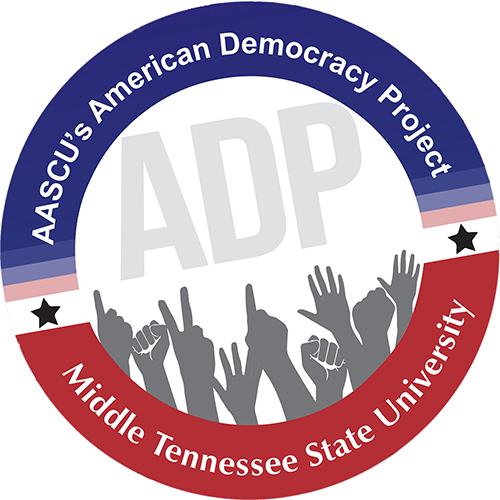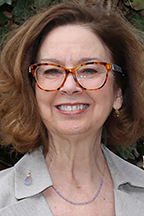Five eminent jurists illuminated the foundation of our nation’s laws and the role of judges in interpreting those laws as part of MTSU’s 2017 Constitution Day festivities.
Under the title “The Constitutional Role of an Independent Judiciary in a Democracy,” the senior and retired federal and state appellate judges and justices gathered for a panel discussion in the James Union Building’s Tennessee Room, where they examined a wide range of topics, both in the abstract and in the context of current events.

A judicial panel assembled for MTSU’s 2017 Constitution Day celebration awaits questions from the moderator during the Sept. 20 event in the James Union Building. Seated from left are author and panel moderator Keel Hunt; Gary Wade, former Tennessee Supreme Court chief justice; Martha Craig Daughtrey, senior judge, U.S. Court of Appeals, Sixth Circuit; Curtis Collier, senior judge, U.S. District Court, Eastern District of Tennessee; Penny White, former Tennessee Supreme Court justice; and Alberto Gonzales, former U.S. attorney general. (MTSU photo by Andy Heidt)
Former Tennessee Supreme Court Justice Penny White addressed the ongoing ideological dispute between so-called “strict constructionists,” who believe that the Constitution should be interpreted literally, and those who believe the interpretation of the Constitution should be flexible over time as society changes.
“I believe that the Constitution is a living document, that it has to adjust as times adjust,” said White, now E.E. Overton Distinguished Professor of Law at the University of Tennessee College of Law.
“Just for example, we confront all sorts of searches that weren’t even thought about, searches of (the) internet, searches of phone devices, that weren’t even thought about when the Constitution was drafted.”
Another former state Supreme Court justice, Martha Craig Daughtrey, noted that emerging democracies look to the American judiciary as a model, although they do not seek to replicate the American executive and legislative models.
“There is a widespread universal respect for the courts, and it goes back to the independence of the courts,” said Daughtrey, who is now senior judge on the U.S. Court of Appeals, Sixth Circuit.
Without mentioning President Donald Trump by name, Daughtrey decried what she perceived to be a recent “disrespect for the judicial branch” on the part of the executive.
“It is hard to imagine how much damage that does among people looking at the court system,” she said.
Belmont College School of Law Dean Alberto Gonzales, who was U.S. Attorney General during President George W. Bush’s administration, contended that judges should be subject to criticism. However, he asserted that the criticism should be delivered respectfully.
“Sometimes judges get it wrong,” said Gonzales, a former Texas Supreme Court justice. “We wouldn’t have courts of appeals and the Supreme Court if trial court judges always got it right … It’s how you do it.”

Former U.S. Attorney General Alberto Gonzales answers a question during a judicial panel assembled for MTSU’s 2017 Constitution Day celebration Wednesday inside the James Union Building. Next to him is Penny White, former Tennessee Supreme Court justice, and at left is Curtis Collier, senior judge, U.S. District Court, Eastern District of Tennessee. (MTSU photo by Andy Heidt)
Curtis Collier, senior judge for the U.S. District Court of the Eastern District of Tennessee, was asked about the role of the judiciary in the thorny issue of immigration.
“Immigration is one of those areas where all three branches have a very strong interest and those interests will compete and conflict,” said Collier. “And, if there is not a resolution politically, it, ultimately, will end up in the hands of the judiciary.”
Former state Supreme Court Chief Justice Gary Wade likened the judiciary to a “referee” that settles disputes between the executive and legislative branches.
“When called upon to make a call, whether it’s an executive order or a piece of legislation that might conflict with constitutional principles, the court makes that call,” said Wade, who now is vice president and dean of the Duncan School of Law at Lincoln Memorial University in East Tennessee.
Keel Hunt, author and columnist for The Tennessean, moderated the panel discussion, which included an audience question-and-answer session.
The discussion, which was sponsored by the MTSU chapter of the American Democracy Project, capped a day of public readings of sections of the Constitution at various locations around campus, as well as a voter registration drive.

MTSU freshman Michaela Moore of East Ridge, Tenn., reads the U.S. Constitution outside the Science Building as part of the university’s Constitution Day celebration Wednesday Sept. 20. Students, faculty, staff, visitors and other volunteers from MTSU’s academic colleges read the 230-year-old document at sites across campus during the event, coordinated by the MTSU chapter of the American Democracy Project. (MTSU photo by Andy Heidt)
“We want civic learning to be pervasive, not partial, across our university, and central, not peripheral, to our identity,” said Dr. Mary Evins, American Democracy Project coordinator, describing the importance of the campuswide celebration.
MTSU has celebrated the 1787 signing of the Constitution for the past 12 years. Because this year’s actual Constitution Day was Sunday, Sept. 17, the celebration was scheduled for Sept. 20.
— Gina Logue (gina.logue@mtsu.edu)

Stephen Smith, interim associate dean of the MTSU College of Liberal Arts, reads the U.S. Constitution outside the James Union Building as part of the university’s Constitution Day celebration Wednesday, Sept. 20. Students, faculty, staff, visitors and other volunteers from MTSU’s academic colleges read the 230-year-old document at sites across campus during the event, coordinated by the MTSU chapter of the American Democracy Project. (MTSU photo by Andy Heidt)
‘Eminent’ judges’ panel will discuss judiciary at Constitution Day observance
Sept. 12, 2017
MTSU is calling on some of Tennessee’s most esteemed judges Wednesday, Sept. 20, to wrestle with one of the most searing issues in America today: the constitutional role of an independent judiciary.
The university’s annual observance of Constitution Day will feature a five-member panel, moderated by author Keel Hunt, in the Tennessee Room of the James Union Building from 2:30 to 4 p.m. Sept. 20.
The university celebrates the Constitution’s 1787 signing every year with special events and programs, including voter registration drives and readings of the document by students, faculty, staff, special guests and volunteers across campus throughout the day.
Sept. 17 marks the 230th anniversary of the signing of the U.S. Constitution. MTSU is observing it three days later to encourage more student and community participation.
The MTSU discussion, which is sponsored by the campus chapter of the American Democracy Project, is free and open to the public. A campus parking map is available at http://tinyurl.com/MTSUParkingMap, and off-campus visitors can park free in the Bell Street lot, located across Middle Tennessee Boulevard from the JUB.
The 2017 Constitution Day panel includes:
- Curtis Collier, senior judge, U.S. District Court, Eastern District of Tennessee, and a former assistant U.S. attorney.
- Martha Craig Daughtrey, senior judge on the U.S. Court of Appeals, Sixth Circuit, and a former Tennessee Supreme Court justice.
- Alberto Gonzales, dean of Belmont University’s College of Law and a former Texas Supreme Court justice and U.S. attorney general.
- Gary Wade, vice president and dean of the Duncan School of Law at Lincoln Memorial University and a former chief justice of the Tennessee Supreme Court.
- Penny White, the E.E. Overton Distinguished Professor of Law and director of the Center for Advocacy and Dispute Resolution at the University of Tennessee’s College of Law and a former Tennessee Supreme Court justice.
MTSU faculty and students will submit questions for the panel to address, and the group also will answer questions from the audience.
 These distinguished guests are the latest in a string of Constitution Day speakers and events that have enlightened the MTSU community since 2005, including civil rights activist and Nashville sit-in participant Diane Nash; the Revs. C.T. Vivian and James Lawson Jr., civil rights activists who spoke on the Voting Rights Act; longtime Iowa congressman James A. Leach, former chairman of the National Endowment for the Humanities; National Public Radio legal affairs correspondent Nina Totenberg; a special on-campus session, via the Supreme Court Advancing Legal Education for Students program, of the Tennessee Supreme Court to hear three appellate cases; and even a special U.S. naturalization ceremony for 300 people taking the oath of citizenship inside MTSU’s Murphy Center.
These distinguished guests are the latest in a string of Constitution Day speakers and events that have enlightened the MTSU community since 2005, including civil rights activist and Nashville sit-in participant Diane Nash; the Revs. C.T. Vivian and James Lawson Jr., civil rights activists who spoke on the Voting Rights Act; longtime Iowa congressman James A. Leach, former chairman of the National Endowment for the Humanities; National Public Radio legal affairs correspondent Nina Totenberg; a special on-campus session, via the Supreme Court Advancing Legal Education for Students program, of the Tennessee Supreme Court to hear three appellate cases; and even a special U.S. naturalization ceremony for 300 people taking the oath of citizenship inside MTSU’s Murphy Center.

Dr. Mary A. Evins
“We’ve had the last couple of Constitution Days focused on civil rights issues, memories from the civil rights era, the parts of the constitution that had to do with justice for all, and after all is said and done, really the very core of what the constitution is about is the establishment of how our government functions, its three major components: the tripartite system of checks and balances that our framers, our founding fathers, built into the system,” said Dr. Mary A. Evins, an associate research professor at MTSU’s University Honors College and coordinator for MTSU’s American Democracy Project.
“And it seemed as though this year, with some aspects of the executive (branch) feeling chaotic and some aspects of the legislative (branch) feeling as though it’s in stalemate, that maybe this was a year to focus on that other pillar of our constitutional system, which is our judiciary.
 “These eminent judges come from different backgrounds, they were appointed to their positions by different presidents or governors, and they will have different views of the law, so we think we can have a pretty lively discussion.”
“These eminent judges come from different backgrounds, they were appointed to their positions by different presidents or governors, and they will have different views of the law, so we think we can have a pretty lively discussion.”
MTSU’s WMOT-FM Roots Radio 89.5 will also dive into the celebration beginning at 11 a.m. Sept. 20 for an hourlong program illustrating the U.S. Constitution through contemporary song, hosted by Keith Bilbrey of Music City Roots and Dean Ken Paulson of MTSU’s College of Media and Entertainment.
For more information about American Democracy Project events at MTSU, email amerdem@mtsu.edu or visit www.mtsu.edu/amerdem.
— Gina E. Fann (gina.fann@mtsu.edu)


COMMENTS ARE OFF THIS POST